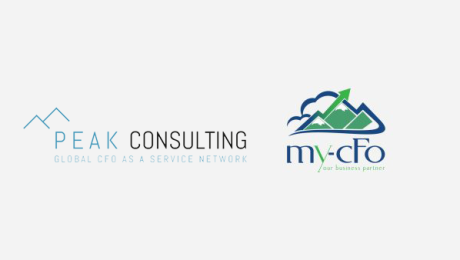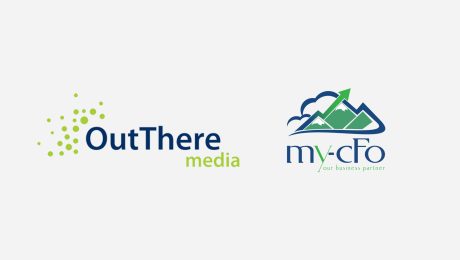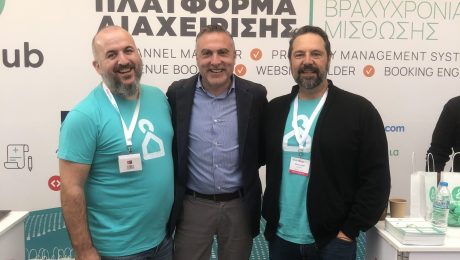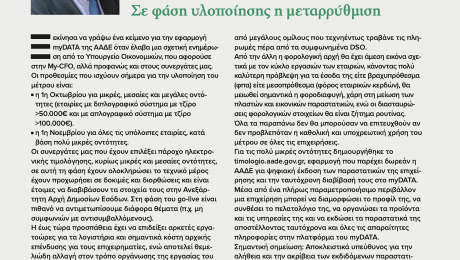My-CFO PC is an independent member of the Peak Consulting global CFO Network
Peak Consulting offers a full range of CFO related services from the CFO role to all aspects of the CFO remit: bookkeeping, invoicing, accounts preparation, controlling, reporting, financial modelling.
The network includes local CFO as a Service providers in numerous countries around the world. The geographical footprint is complemented by the broad sector experience of the network’s members – from Life Sciences to Fintech, from service companies to manufacturers and SaaS.
Visit www.peak-consulting.info for more information
- Published in Business Finance in Action, new client, Talk of The Week
Group CFO services to O.T.M. Holding Gmbh, from My-CFO pc
Time flies and a seven-month assignment, to support Out There media group as Group CFO Director, has passed very quickly.
OTM, headquartered in Austria – with legal entities in Greece and Singapore, and commercial offices in South Africa, Ghana, Nigeria, USA, Mexico etc., is a leading mobile advertising and data monetization firm that uniquely links mobile operators with the advertising world via its proprietary, award-winning technology Mobucks™.
My-CFO pc, took over the Group Finance department, establishing a new team, new SOPs and tackled delicate Finance issues with success.
As a next step in our collaboration, My-CFO will support the Group as tax advisor in a part-time basis.
Thank you OTM for the trust and opportunity you have placed in My-CFO pc.
#groupcfo #mobileadvertising #cfoservices #fractionalcfo #accounting #tax#banks #reporting #collaboration #FTE #startups
- Published in Business Finance in Action, dummyTerm, new client, Talk of The Week
CFO services to Hosthub Inc from My-CFO pc
CFO services to Hosthub Inc from My-CFO pc
The 2023 1st quarter begins where 2022 was left, with a new collaboration between Hosthub Inc (Delaware – USA) and My-CFO pc (Athens – Greece).
Hosthub is No1 Top rated Property Management Platform for Short Term Rentals that Increases your revenue, improves your operations, and saves time and money with the best Channel Manager & PMS in the industry. Hosthub is a Greek-origin start-up with customers in 87 countries worldwide, that has everything you need to manage your properties effortlessly and reliably.
My-CFO Greece is taking over US Accounting (QuickBooks) and Tax services, the Greek branch’s Accounting, Tax, Payroll, and CFO services such as Bank relations, NSRF Competitiveness programs, and more.
Thank you Alexander Caravitis & Petros Ziogas
#startups #startupecosystem #cfoservices #fractionalcfo #accounting #tax#banks #propertymanagement #propertysoftware #collaboration #NSRF#quickbooks #quickbooksonline
- Published in Talk of The Week
Συνεργασία με Megacycle Facility mgt IKE
Η εταιρεία My-CFO ξεκίνησε μια νέα συνεργασία με την Μegacycle Facility Management IKE, εταιρεία που προσφέρει ολοκληρωμένες λύσεις καθαρισμού & υγιεινής, είτε μέσω της παροχής υπηρεσιών είτε μέσω της πώλησης προϊόντων & συστημάτων καθαρισμού.
Η Megacycle ξεκίνησε την πορεία της το 2015 στον κλάδο του Facility Services και πολύ γρήγορα κέρδισε την εμπιστοσύνη συνεργατών και πελατών. Έκτοτε, έχει σημειώσει επιτυχημένες συνεργασίες με μεγάλα ονόματα επαγγελματιών, ανταποκρινόμενη στις προκλήσεις ακόμα και των πιο απαιτητικών έργων, σε όλη την Ελλάδα, από γραφεία και καταστήματα, μέχρι ξενοδοχεία, κτίρια του δημοσίου τομέα και αεροδρόμια. Ως αποτέλεσμα της εξειδίκευσης στον τομέα του καθαρισμού και της συνεχούς αναζήτησης για πρωτοποριακά, νέα προϊόντα, δημιούργησε το Megacycle Store, ένα σύγχρονο ηλεκτρονικό κατάστημα, το οποίο καλύπτει όλο το φάσμα των αναγκών καθαρισμού & υγιεινής επαγγελματικών χώρων.
H συνεργασία που ξεκίνησε τον Σεπτέμβριο του 2022 περιλαμβάνει αφενός την Αναδιοργάνωση της εταιρίας και αφετέρου την Οικονομική διεύθυνση της, σε part-time βάση.
Στην My-CFO πιστεύουμε ότι η εμπειρία μας στον κλάδο του Facility Management θα βοηθήσει σημαντικά στην Ανάπτυξη και θα βάλει γερές βάσεις στην Κερδοφορία της Megacycle.
- Published in new client, Talk of The Week
Παρουσίαση Business Finance in Action
Ακολουθεί το σχετικό video:
- Published in Business Finance in Action, Talk of The Week
Άρθρο στο περιοδικό Finance pro σχετικά με την εφαρμογή MyDATA, εκδόσεις BOUSSIAS, τεύχος 008
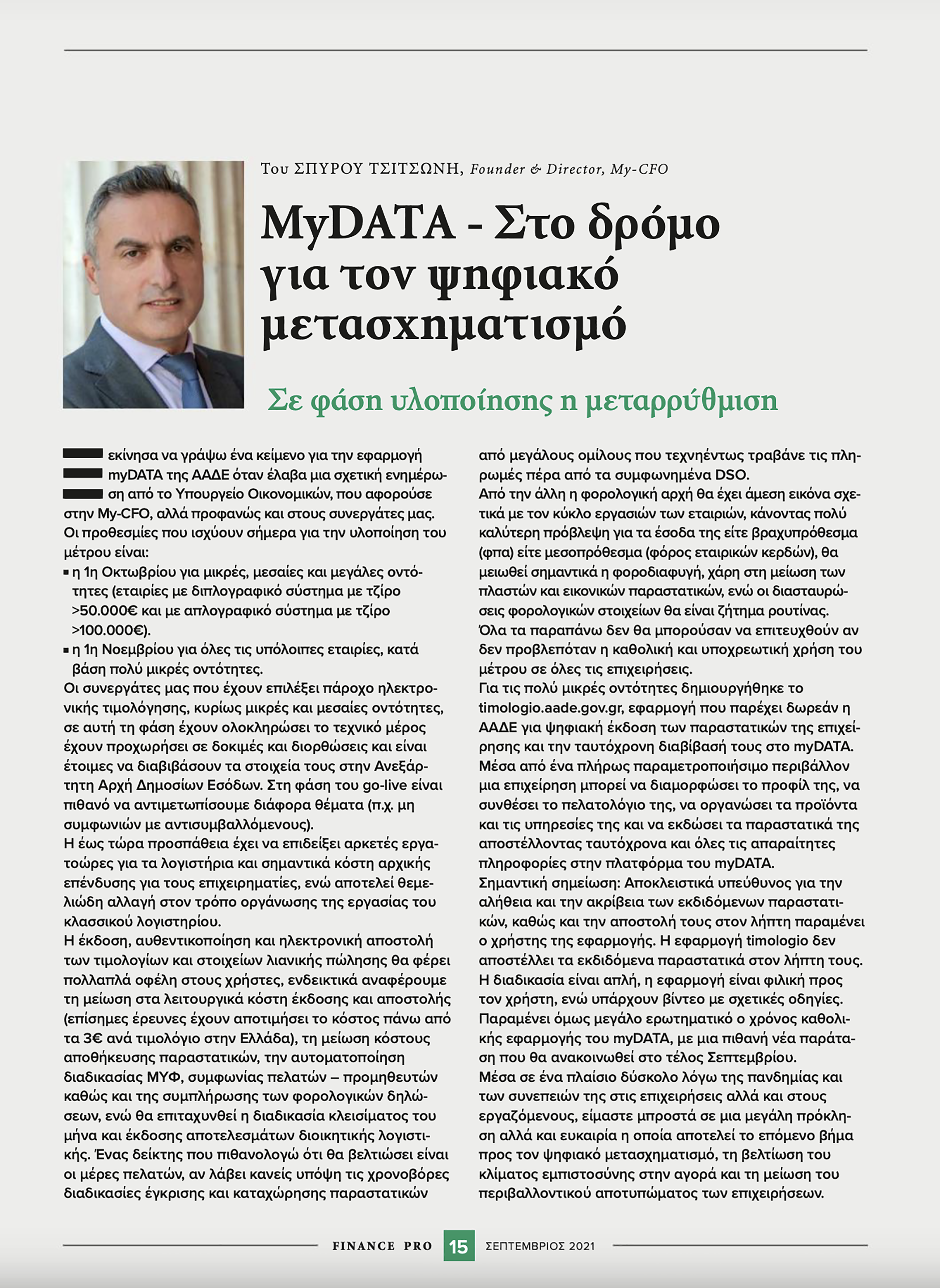
Στο τεύχος Σεπτεμβρίου του FinancePro μπορείτε να διαβάσετε μεταξύ άλλων τα ακόλουθα θέματα:
– Γεώργιος Αντύπας: «Η Revival στέκεται αρωγός σε κάθε επιχείρηση, κάνοντας πράξη το 360° Responsibility».
– Ελευθέριος Πέτσας: «Το σύγχρονο Finance στέλεχος δημιουργεί προστιθέμενη αξία στην επιχείρηση»
- MyDATA: Η μεταρρύθμιση που αλλάζει τη δυναμική του φορολογικού μηχανισμού
- Βιώσιμη ανάπτυξη: Οι CFOs κρατούν το κλειδί της νέας εποχής αειφορίας
- Οικονομία: Γοργή η ανάπτυξη, μεγάλες οι προκλήσεις
- Η νέα εποχή στην εργασία
- Ανεβάζουν ταχύτητες οι υπηρεσίες cloud computing
Ξεφυλλίστε το FinancePro από οποιαδήποτε συσκευή, όπου και αν βρίσκεστε. Η έντυπη έκδοση κάθε τεύχους είναι κοντά σας με ένα κλικ!
Το άρθρο μας βρίσκετε αναλυτικά στη σελίδα 15 του τευχούς
Η My–CFO βοηθάει μικρομεσαίες επιχειρήσεις να δώσουν λύσεις σε καθημερινά θέματα που αφορούν στον Οικονομικό Σχεδιασμό και την Ψηφιακή Μετάβαση.
https://lnkd.in/dBE_HrqB
My–CFO Single Member pc
#finance #mydata #digitaltransformation
- Published in Talk of The Week
Παρουσίαση στο online Συνέδριο Business Finance in Action – Boussias publications, best practices sharing – Unison (ISS)
Ολόκληρο το Video από την παρουσίαση μου στο συνέδριο Business Finance in Action που διοργάνωσε η Boussias Communications με προσκεκλημένους αναγνωρισμένους Οικονομικούς Διευθυντές και ανώτατα οικονομικά στελέχη της Ελληνικής αγοράς. Στο πλαίσιο του διαμοιρασμού βέλτιστων πρακτικών με τη χρήση της τεχνολογίας, το θέμα της παρουσίασης, ήταν η αλλαγή και βελτιστοποίηση του συστήματος παραγγελιοληψίας του Ομίλου εταιρειών Unison (πρώην ISS).
- Published in Talk of The Week, Χωρίς κατηγορία
Συνεργασία με GreenFrost AE & EuroFreeze IKE
Η εταιρεία My-CFO ξεκίνησε μια νέα ελπιδοφόρα συνεργασία με τις εταιρείες ψυκτικών εφαρμογών και εμπορίας ψυκτικών μηχανημάτων / ανταλλακτικών, EuroFreeze & GreenFrost αντίστοιχα τον Ιούνιο του 2021.
Η εταιρεία EuroFreeze, με έτος ίδρυσης το 2006, αναλαμβάνει την μελέτη, τον σχεδιασμό και την υλοποίηση των εγκαταστάσεων συντήρησης – ψύξης και βαθιάς κατάψυξης τροφίμων σε χώρους εστίασης, αποθήκευσης και πώλησης.
Το μεγάλο εύρος δραστηριότητας της καλύπτει ανάγκες μικρών επιχειρήσεων όπως mini markets, κρεοπωλεία, μέχρι μαζικών χώρων εστίασης, σούπερ μάρκετ και ξενοδοχείων. Σημαντικότεροι πελάτης της είναι οι Lidl Hellas, Δ. Θανόπουλος Α.Ε. , AHT, Hauser.
H εταιρεία GreenFrost ιδρύθηκε το 2013 με σκοπό να καλύψει τις ανάγκες των επαγγελματιών τεχνικών ψυκτικών όσον αφορά τα ψυκτικά μηχανήματα, τα ανταλλακτικά τους και τα αναλώσιμα, με βασικούς πελάτες της τις Ελληνικές Υπεραγορές Σκλαβενίτη Α.Ε. & Δ. Θανόπουλος Α.Ε..
Η My-CFO αναλαμβάνει την ανάπτυξη και τον έλεγχο του οικονομικού σχεδιασμού, την βελτιστοποίηση και τον έλεγχο των διαδικασιών των εταιρειών με στόχο την μεγιστοποίηση της αποδοτικότητας των κεφαλαίων και του έμψυχου δυναμικού τους.
Ευχόμαστε αυτή η συνεργασία, πρώτη για την My-CFO μετά την ίδρυσή της τον Μάιο του 2021, να είναι προσοδοφόρα και επικερδής για αμφότερα τα μέρη της.
Σπύρος Τσιτσώνης
Founder & Director
- Published in new client, Talk of The Week
Why Today’s Startups Pursue Both Ideas and Ideals
Many startup leaders aim for growth first and foremost. Although they might like the idea of running a business according to a greater purpose, they regard that as a luxury they can ill afford. Achieving product-market fit is, as venture capitalist Marc Andreessen has claimed, “the only thing that matters” early on. Once they’ve established their businesses as profitable, these entrepreneurs have difficulty breaking from this mindset. They aim for another, more ambitious goal: even bigger growth.
This notion that startups must focus obsessively on growth, and that growth and purpose are somehow conflicting, is misguided. A number of experts have emphasized how important it is to cultivate meaning and to have a “why” firmly in sight when starting companies. Over the past several years, I’ve increasingly observed fast-growth startups, ranging from agro-venture Gotham Greens to health-tech venture Livongo to eyeglasses retailer Warby Parker, mobilizing for purpose at a very early age — much sooner than we might presume and well before they achieve product-market fit. Instead of simply talking about and executing on a new idea, the leaders of these young companies talk about — and commit themselves to — a grand ideal. They want to achieve financial success, but they also want to advance societal goals such as making agriculture more sustainable and equitable, improving patients’ lives and the health care system, and transforming commerce to be more humane.
This fixation on purpose isn’t mere posturing. These entrepreneurial leaders are true believers. They’re also pragmatic doers who see purpose as a key to unlocking their success. As they understand it, idealism doesn’t have to preclude a practical orientation toward business; the two can go hand in hand, giving rise to a virtuous cycle in which companies challenge themselves to become progressively better at delivering on both purpose and profit. These leaders applaud the pursuit of ideals in moral terms, but they also clearly see its strategic and operational advantages.
[ Advantage 1 ]
In risky startup ventures, founders and early employees must make bold, imaginative choices in the face of adversity. Most teams are genuinely inspired to chase an exciting business idea, which helps guide them through this difficult process. But striving after an ideal in addition to an idea enhances their motivation, tapping into their deeply held values and beliefs. As my colleague Rebecca Henderson has observed, these dual goals widen people’s ambition, impelling them to solve systemic problems that enhance overall value creation.
In 2009, Viraj Puri cofounded the indoor farming and fresh-food company Gotham Greens. The startup’s mission is to reimagine food production, “creating new ways to farm, produce local food, revitalize communities, and innovate for a sustainable future.” As Puri told me in an interview, the company’s purpose inspired him and his founding partners from the beginning: “We were very idealistic early on. Our goal was to be carbon neutral or at least net neutral for energy, and recycle 100% of our irrigation water.” The team also cared about enhancing local communities and their relationship with food. Such idealism led to defining moves the company might not have made otherwise, such as siting its first greenhouse on a rooftop in New York City rather than in a more economical location in a rural area. Doing so enabled the company to engineer a new form of sustainable urban agriculture that would allow city dwellers to remain close to their food.
But dedication to a purpose didn’t simply lead the firm to “do good.” It also motivated Puri and his team to generate attractive returns for investors. “If we were going to make a positive impact and a real, lasting difference to the food system, the business would have to be financially sustainable,” he explained. “We didn’t want to just rely on copious amounts of venture capital money, grow at all costs, and not show a profit. Neither did we want to rely on grants or have a nonprofit approach.”
In other words, to make food production more sustainable and a boon to communities, the founders had to operate at scale. And that meant their business had to be profitable. Purpose, in this case, inspired the founders to become more focused on unit economics, not less. In particular, they elected to expand slowly into new geographies to ensure they had “very strong, four-wall economics and strong flow and profitability.” The result was a thriving business that by 2020 had built eight greenhouse facilities, employed more than 350 people, had attracted $130 million in investment, and was selling its products in 40 U.S. states.
[ Advantage 2 ]
Entrepreneurs seeking to launch and build startups must convince a range of stakeholders — including employees, investors, customers, and suppliers — to take a risk on them. Selling an ideal rather than merely an idea makes for a far more compelling pitch. After all, ideas appeal to the head, while ideals potentially speak to both the head and the heart.
Glen Tullman founded the consumer digital health provider Livongo in 2014 with the purpose of “empowering people with chronic conditions to live better and healthier lives.” Contracting with employers and health plans, the company uses digital technology to help members better manage their chronic conditions, keeping them well while helping employers lower their costs. Tullman drew inspiration from his son, who was burdened by the need to manage his diabetes.
It turned out that top digital talent also found the mission inspiring. As Dave Engberg, Livongo’s chief technology officer, says, “We were able to recruit some people that, if we had just been a social network for cats or something, would have chosen something else.” Engberg, whose father had diabetes, noted that he could win over in-demand Silicon Valley engineers simply by describing the impact the company was having. “I could explain to them that when we’ve got half a million people on our program for diabetes, there are literally tens of thousands of them who have avoided a major medical complication as a result.” To ensure that new employees felt inspired by the mission, Livongo hired and promoted people around their resonance with it. As Tullman said, “I want people to come because of their commitment to make a difference in people’s lives.”
The talent Livongo attracted was highly motivated as well. Many employees — a full third of Livongo’s workforce as of 2019 — had a chronic condition like diabetes, while another third had family members who were stricken with such a condition. They felt deeply driven to help improve the lives of patients managing chronic illnesses. Livongo’s high-quality, committed workforce fueled its commercial success, and in 2020 the company was acquired at a valuation of $18.5 billion, over five times its IPO value from a year earlier.
Another entrepreneur I spoke with, Jon Olinto, observed that purpose plays a vital role in helping young startups survive because it inspires early employees to make outsize contributions. When founding his first venture, the restaurant chain B.Good, Olinto and his partner, Anthony Ackil, had a clear purpose in mind — reinventing fast food to be healthful. People put their all into the company, he noted, treating it as more than a job, because they believed in the purpose. After leaving B.Good, Olinto injected purpose from the outset into a new startup he cofounded, One Mighty Mill, which fresh mills its own flour for its line of healthy foods. Dedicated to restoring “local food systems that help our communities be healthy and thrive,” the startup has won designation as a certified B Corporation from B Lab, an external certifying body that ensures compliance with a set of standards involving governance, community, and the environment.
[ Advantage 3 ]
Startups can be chaotic and often break apart under the strain of the immense challenges they face. As my colleague Tom Eisenmann reports in his recent book, Why Startups Fail, as many as three-quarters of U.S. firms backed by venture money fold. Although business risks are a key factor, it often happens, as I have written about before, because of their failure to scale. As startups grow, not only can they lose their strategic focus, but their founding culture often becomes more diffuse and their intense spirit of community and team identity subsides. Employees often convey this change by observing that the growing company has lost something vital and intangible — its very soul.
Fidelity to a purpose helps to keep team members aligned and connected throughout this process, assembling them into a cohesive community over the long term. From the very beginning, founders should create a clear culture that infuses coherence, connectivity, and soul into the budding enterprise, creating a foundation upon which to scale. Purpose creates a shared framework of values and assumptions that serves as a filter for strategies and executional tactics. It also aids collaboration — especially important today, when more team members are working remotely.At Warby Parker, a strong culture has risen up around the ideal of giving everyone access to affordable eyewear. Cofounder and co-CEO Neil Blumenthal told me the firm takes great pains to inculcate the company’s values in new members of its growing workforce. Team members’ awareness of the purpose leads to pride and dedication — to a sense of serving a common cause. It also fosters an environment of close-knit teamwork. “You’re starting from a place of greater trust,” Blumenthal says, “because there are presumably people to the right and left of you that have a similar belief system, namely in trying to achieve a particular mission.”
Trust, behavioral norms, and a belief system linked to purpose are so deeply ingrained at Warby Parker that they shape everyday decision-making. One of its newest products, a line of contact lenses called Scout, arose as a result of a cross-unit collaboration driven by the firm’s purpose. The team members worked together to ensure that Scout delivered on it, most notably in its accessible pricing and eco-friendly packaging.
To be sure, purpose isn’t the only path to success for a startup, but the advantages it offers are both underappreciated and important. Large companies are increasingly putting themselves on the path toward deeper, more sustained engagement with purpose, and it would behoove startups to do the same. The venture ecosystem should get on board as well, using fidelity to a purpose as a filter for selecting startups to fund, and encouraging founders to nurture and sustain commitment to the purpose as the enterprise grows. Big ideas certainly matter. But at all times in a company’s life cycle, so do grand ideals.
- Published in Talk of The Week
8 Questions a CEO Might Want to Ask Their CFO
1. If we had an audit, would we receive a clean opinion?
Many small, privately held businesses do not need nor can afford to undergo a full accounting audit. But a clean audit opinion is the standard used to gauge the quality of an accounting system. Not qualifying for a clean audit might imply low-quality financial and management reports, customer billing issues, incorrect information provided in tax returns, gaps in financial controls for detecting theft or fraud or other issues.
What to listen for in an answer: If your CFO knows there are material gaps in the accounting and financial processes, maybe you should be concerned. Does the CFO have a reasonable plan to make any necessary improvements?
2. What is our relationship with our accounting firm?
When businesses start, they focus on making and selling a product or service. They may not be able to afford full-time, in-house financial staff to handle processing transactions and preparing financial statements, so they outsource these activities.
As the business grows it may hire financial staff, but they may also keep the existing relationship with the accounting firm. When asking this question, you’re wanting to get an update on where you stand.
What to listen for in an answer: If the company is performing many accounting and financial functions in-house, these should no longer be performed by the accounting firm and billings should be reduced accordingly.
Another possibility? When businesses are just getting started, they usually have a difficult time getting a full-service accounting firm, instead opting to work with a smaller firm. So when the business grows, it may have outgrown the original firm. If that’s the case for your business, now could be a good time to look for a new firm. This concept of outgrowing one’s initial professional service provider can also apply to your law firm, insurance agent or banker.
3. Why do we close the books and produce the financial statements on X workday each month?
Closing the books and preparing the financial statements is a necessary and important function. It’s work that takes a historic look at the company’s business transactions.
The value added of having a CFO and in-house financial staff is their assistance in running the business more effectively and providing a forward-looking view of the company’s finances.
What to listen for in an answer: First, it’s important to know that the CFO has a well-thought-out and documented process for closing the books and producing financial statements. Second, it’s good to know that the CFO is not procrastinating in closing the books, which might be his or her “comfort zone,” instead of making time available to help you run the business.
. How can we become more accurate in our cash-flow forecasting?
While sales and income are often the two most frequently reported metrics for a company’s performance and achievements, cash flow can be just as important. Will there be sufficient funds to make payroll, to buy equipment, to undertake an IT upgrade or marketing program, etc.?
While knowing that there’s cash in the bank last night is important, having a good estimate of cash balances projected for next month or next quarter can help make a business function smoothly.
What to listen for in an answer: It helps to know that your company has a cash forecasting process, and not just a back of the envelope swing at it.
You can also listen to see if the CFO is using all the talent in the company to derive the forecast. A forecast based on inputs from marketing, sales, operations, R&D and the other company functions carries the full knowledge of the company. Conversely, a forecast prepared solely by the CFO will have only his or her best judgement. The CFO’s answer can also help you understand when new financing might be required or desired so it can be appropriately planned for.
5. What are the best metrics for measuring our profitability and productivity?
(Some might phrase this as “What keeps you up at night?”) Businesses can keep evolving with new product lines, manufacturing processes, channels of distribution or number of locations. Is your business reporting and analytics keeping up with the changing business? Are you adopting new industry reporting standards? Are employee bonuses being paid on the right metrics?
What to listen for in an answer: A good answer can show you that the CFO is thinking about the whole business. They can show you that they have thought about the metrics and are forecasting the results to identify business risks and concerns.
6. If we are ever in challenging times, where can we tighten our belts?
Layoffs, cut backs and other similar reactions to a reduction in sales and cash flow can be difficult and fraught with tension. You may never know when it will happen, but it’s good to be prepared.
What to listen for in an answer: Ideally, you would want your CFO to convey that they have been thinking about the business. It’s reassuring to know that they have an inventory of ways to preserve cash if the need arises. They don’t necessarily need to broadcast these tools until they’re needed, but it’s good to have a pulse on the business.
7. What backup plans are in place in case you’re unavailable to carry out your duties?
This question is about succession planning in the short term. As CEO you may want to be thinking about this for each of your direct reports and theirs.
What to listen for in an answer: If your CFO ever needed to step away from their duties, you want to know that there are plans and procedures in place to keep the show going in their absence.
8. If this were your business, what would you do differently?
To be an effective business partner, your CFO needs to feel like they are a part of the business—not just that they work there. This question asks the CFO to think big—if they were in complete control, what would they do? This might help you identify any of your “blind spots.”
What to listen for in the answer: This isn’t an opportunity for your CFO to complain or vent. You want to hear them give specific suggestions regarding elements of your business, and have them be explained in a logical manner and supported with appropriate analysis.
In addition to the specific business issues, also listen for people issues, especially how the CFO is feeling about the relationship with you, their boss and business partner. If you are looking for the CFO to be a business partner, then he or she should be encouraged to provide suggestions and critiques that might go against something you favor. In my experiences, the CEO looked to me to provide the contrarian viewpoint.
To be effective business partners, CEOs and CFOs should have a continuous dialogue about the business and often about their relationship. The CEO can initiate the conversation, provide suggestions where appropriate and help the CFO continue to be or become a valued business partner.
- Published in Talk of The Week
- 1
- 2

